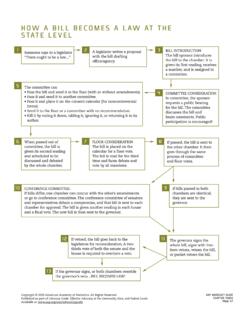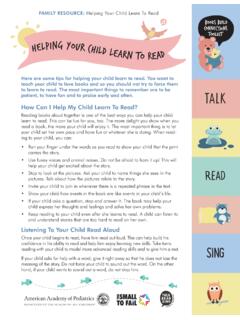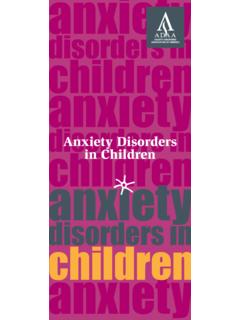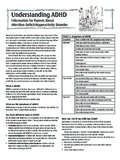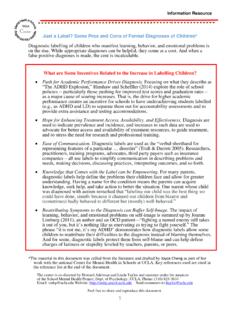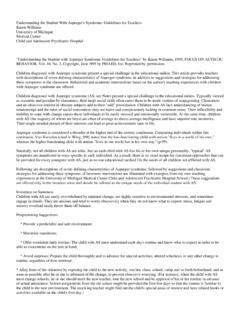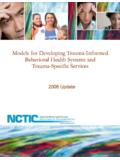Transcription of Adverse Childhood Experiences and the Lifelong ...
1 1 Many people can identify a person in their lives who struggles with a chronic illness like heart disease, diabetes, or hypertension. Most people also know someone who struggles with mental illness, substance abuse, or relationships in general. Traditionally, the health care system would point to high-risk behaviors such as poor diet, drug use, or a sedentary lifestyle as the primary causal factors. Questions for patients have focused on What s wrong with you? rather than What happened to you? A 1998 study from the Centers for Disease Control and Prevention (CDC) and Kaiser Permanente is leading to a paradigm shift in the medical community s approach to disease. This study of more than 17,000 middle-class Americans documented quite clearly that Adverse Childhood Experiences (ACEs) can contribute significantly to negative adult physical and mental health outcomes and affect more than 60% of ,2 This continues to be reaffirmed with more recent studies.
2 Adverse Childhood Experiences and the Lifelong Consequences of Trauma 2 Adverse Childhood Experiences include Emotional abuse Physical abuse Sexual abuse Emotional neglect Physical neglect Mother treated violently Household substance abuse Household mental illness Parental separation or divorce Incarcerated household memberAlong with the original 1998 ACE Study, there are known predictive factors that make sense to include in the list of Adverse Experiences . These can be single, acute events or sustained over time. Examples include death of a parent and the detrimental effect of community violence and poverty, among Adverse Childhood Experiences occur regularly with children aged 0 to 18 years across all races, economic classes, and geographic regions; however, there is a much higher prevalence of ACEs for those living in poverty.
3 While some stress in life is normal and even necessary for development the type of stress that results when a child Experiences ACEs may become toxic when there is strong, frequent, or prolonged activation of the body s stress response systems in the absence of the buffering protection of a supportive, adult relationship. 4,5 The biological response to this toxic stress can be incredibly destructive and last a lifetime. Researchers have found many of the most common adult life-threatening health conditions, including obesity, heart disease, alcoholism, and drug use, are directly related to Childhood adversity. A child who has experienced ACEs is more likely to have learning and behavioral issues and is at higher risk for early initiation of sexual activity and adolescent pregnancy.
4 These effects can be magnified through generations if the traumatic Experiences are not addressed. The financial cost to individuals and society is Never before in the history of medicine have we had better insight into the factors that determine the health of an individual from infancy to adulthood, which is part of the life course perspective a way of looking at life not as disconnected stages but as integrated across time. What happens in different stages of life is influenced by the events and Experiences that precede it and can influence health over the life span. An expanding body of convergent knowledge generated from distinct disciplines (neuroscience, behavioral science, sociology, medicine) provides child health care professionals the opportunity to reevaluate what care is needed to maximize the effect on a child s Lifelong health.
5 Importantly, an extensive body of research now exists demonstrating the effect of traumatic stress on brain development. Healthy brain development can be disrupted or impaired by prolonged, pathologic stress response with significant and Lifelong implications for learning, behavior, health, and adult IS THE ROLE OF stress ? stress in itself need not result in injury and is, by its nature, a subjective experience. stress in a supportive environment may not be toxic. The perception of stress varies from child to child; serious threats may not disturb one child, while minor ones may be traumatic to another. This variability is multifactorial depending on a child s previous trauma, social-emotional support, and genetic predisposition.
6 Just as the stress of ambulation helps promote bone and muscle growth, a child needs to experience some emotional stress to develop healthy coping mechanisms and problem-solving skills. Experts categorize stress as positive, helping to guide growth; tolerable, which, while not helpful, will cause no permanent damage; or toxic, which is sufficient to overcome the child s undeveloped coping mechanisms and lead to long-term impairment and stress response can occur when a child Experiences strong, frequent, or prolonged adversity, such as physical or emotional abuse, chronic neglect, caregiver substance abuse or mental illness, exposure to violence, or the accumulated burdens of family economic hardship, in the absence of adequate adult support.
7 This kind of prolonged activation of the stress response systems can disrupt the development of brain architecture and other organ systems and increase the risk of stress -related disease and cognitive impairment well into the adult National Child Traumatic stress Network (NCTSN) definition of traumatic stress encompasses the physical and emotional responses of a child to events that threaten the life or physical integrity of the child or of someone critically important to the child (eg, parent, sibling). It is this out-of-control physiological arousal that is the hallmark of stress that becomes traumatic and can incite what is initially an adaptive response to the stressor that ultimately becomes maladaptive and destructive.
8 While a single event like a natural disaster or an assault by a stranger may constitute toxic stress , the effects multiply when the trauma continues, whether by repetition of similar stresses (eg, an environment of domestic violence or parental drug abuse) or accumulation of disparate ones (eg, parental illness and a hurricane hits town). In other words, there is a dose-response relationship. The effect may be particularly severe when trauma involves the child s primary caregiving system. Termed complex trauma by the NCTSN, this reaction develops over time, as subsequent events reinforce the lessons learned The effect of toxic stress resulting from trauma may not be immediately visible or appear as one would expect.
9 In addition, some traumatic sources of toxic stress may not be readily apparent to the clinician. Psychological maltreatment can be traumatic and Neglect can also be traumatic. Neglect is almost always chronic, as basic needs such as food, shelter, or emotional security are continually not being met. Neglect is often seen in conjunction with abuse and may be exceptionally severe; 71% of child maltreatment fatalities are due to neglect exclusively or in combination with another maltreatment For most children who have experienced trauma and toxic stress , the Experiences began at an early age. As a result, the events may be remote and documented history is often buried among old records or nonexistent.
10 Prenatal exposures that influenced brain development may not be detectable in obstetric records. Pediatricians should understand that presentations of attention deficits, emotional dysregulation, and oppositional behaviors may have their roots in early abuse or neglect or other sources of toxic stress . Recognition of the power of early adversity to affect the child s perceptions of and responses to new stimuli may aid the pediatrician or other clinician in appropriately understanding the causes of a child s BIOLOGY OF TRAUMAThe past few years have brought a dramatic improvement in our understanding of how a healthy brain develops and the effect, positive or negative, that a child s environment has on that process.


